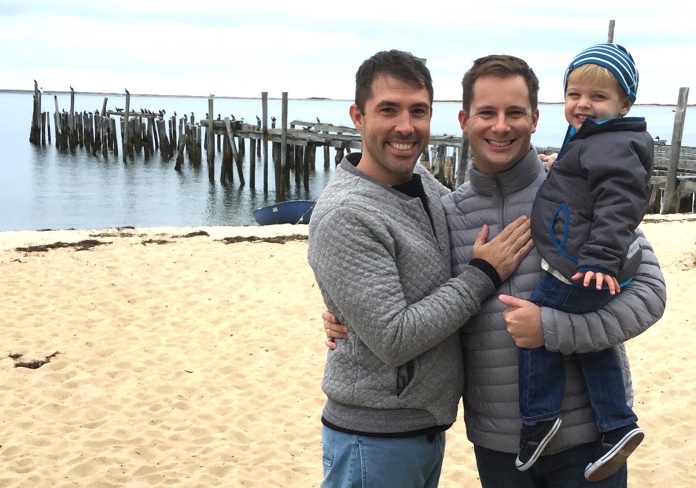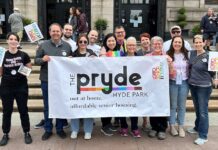[Note: This story is running in the current March/April 2016 Boston Spirit magazine. Subscribe for free today!]
No doubt love makes a family.
Sometimes, however, love can use a little help—especially when it comes to successful parenting.
When Timothy Kelleher, a yoga instructor, and his husband Josh Reed, a digital marketing executive, decided to expand their family through adoption, the two dads-to-be prepared as thoroughly as possible.
Kelleher and Reed had been together for almost 11 years and they felt the time had come. The two had so much love and life experience to share.
For over a year, they did their homework. They made all the right legal moves. They educated themselves in child development. They moved from the South End of Boston and relocated to Jamaica Plain, where they could afford a house with one more bedroom. They planned to bring up their child in a safe neighborhood with good schools and a diversity of family types.
Still, they were amazed when their son Colin’s adoption process went smoothly.
“There’s a lot of stages in the process where things can potentially falter and we were certainly anticipating that,” Kelleher says.
“We were very lucky,” agrees Reed. “Everybody’s adoption process is different. For us, it worked out in a way that was really wonderful and I hope for his natural parents as well.”
Colin was born in 2013, and his new dads were there at the hospital to welcome him into the world.
Like most parents seem to agree, raising an infant comes with many surprises. For starters, Kelleher knew he’d be home alone with Colin several days a week. But, he says, “I began to feel pretty isolated and lonely.”
“Your old friends don’t always know quite what to do with you,” says Reed. He and Kelleher, he adds, were the first in their social circle to have a kid.
In their new neighborhood they found the diversity of family groups they’d hoped for and a welcoming community. However, Reed says, “a lot of the new parent groups are particularly focused around moms.”
This was not exactly a problem. The moms were friendly.
“But when the conversation about breast feeding comes up we can’t really participate in it,” Kelleher says.
Almost all baby products from diapers to playpens, bottles to infant bath soap, storybooks to building blocks, tend to be marketed to women. This is also true of classes and playgroups, TV shows and how-to guides—you name it.
Again, Kelleher and Reed agree, not a major problem.
But the two just wished their new family had a little more support in a way they hadn’t expected.
Birth of the Double Daddies
“We were married in 2009, about five years after the first gay legal marriages in Massachusetts,” Reed says. “Those older than us with kids had them in opposite-sex relationships. In our small circle and neighborhood it felt almost like we were pioneers in being a two-dad family.”
So the pioneering parents struck out on their own, as pioneers do.
“We had one set of friends that was just starting their adoption-process journey,” says Reed. And then through connections among other friends, they began to meet other two-dad teams. They came from all over Boston and the suburbs. Friends of friends, and friends of friends of friends.
And so a new kind of support group was born: Double Daddies.
“Couples started coming to our house,” says Kelleher, laughing. “For a while we had one new couple after another showing up in our living room.”
Kelleher and Reed hosted Double Daddies’ first official meeting, a potluck/play-date. Colin was six months old.
“The first gathering at Josh and Tim’s happened just eight days after our daughter [Kalila] was born,” recalls Michael Wartofsky, who, along with his husband Imtiyaz Hussein, happened to fall into the category of already established friends.
“Joyful but exhausted,” Wartofsky says, “we showed up two hours late. It was a hot summer day so we had her dressed in a onesie, and like novices, we forgot we’d be going to an air-conditioned home. Without skipping a beat, Tim took our daughter in his arms, found her a blanket, and also showed us his ninja method for changing a diaper right on the couch.”
The group grew through word of mouth. Social media. In no time, more than two dozen couples began reaching out to one another through texting or Facebook. Kelleher and Reed hosted the first few home play-dates in their house but soon it started shifting from one home to another.
Out of necessity, spin-off groups formed. “We have two-and-a-half year olds now who like to run and jump and it can be tricky putting them in a room with a whole bunch of babies who need quiet to sleep,” Reed says.
Most of the Double Daddies come together as a big group around Thanksgiving and other holidays. In addition to the home play-dates, they’ve now expanded to include a variety of age-appropriate outings—visits to museums, playgrounds, picnic trips, and even shared vacations.
“It’s incredible to be living in a time and place that we can not only experience parenthood but find community with such an amazing group of gay dads,” says Wartofsky.
“Double Daddies has been so helpful to us,” says Robert Sutfin, who joined the group with his husband Eric Forsberg and daughter Katherine. “It allows us to connect with other gay dads and their children on a regular basis and share stories of adoption, surrogacy, lack of changing tables in men’s bathrooms, and other successes and challenges that we face together.
“Above all else,” Sutfin says, “it’s so great for the kids to make friends with other kids whose families look like ours. Hopefully, it will be more of a resource for them than it is for us.”









